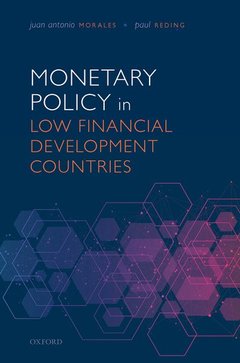Monetary Policy in Low Financial Development Countries
Langue : Anglais
Auteurs : Morales Juan Antonio, Reding Paul

Monetary Policy in Low Financial Development Countries provides a broad coverage of the monetary policy issues faced by developing countries with low financial depth. These low and lower middle income countries are characterized by the predominance of bank finance, shallow financial markets, low financial inclusion, weak integration with world capital markets, and a high degree of informality in economic activity. Monetary policy acquires special twists, making it different in many aspects from the policies followed in advanced and emerging market economies. This book covers the main facets of monetary policy making, using an approach that combines discussions of theoretical arguments, of results from empirical studies and of relevant policy experiences. It presents the monetary policy instruments that central banks rely on in these countries. It assesses the specificities of their monetary transmission mechanism, i.e. the way central banks' actions affect output and prices. It evaluates the advantages, drawbacks, and challenges of the different nominal anchors they may choose from: exchange rate targeting, monetary targeting, and inflation targeting. This discussion is set against the background of the three main goals pursued by central banks: price, output, and financial stability. Particular attention is devoted to the issue of the credibility of central banks and to the trade-offs they face when external shocks, to which these countries are very vulnerable, lead to conflicts among the three goals they pursue. The authors also cover more specific topics, such as the coordination between monetary and fiscal policy, the challenges raised by dollarization, the implications of informal labour markets and of microfinance institutions for monetary policy-making, as well as the role of models for forecasting and policy evaluation by central banks.
Juan Antonio Morales is Professor in the Master's program on Development of the Universidad Católica Boliviana, Bolivia. He has also taught as visiting professor at other Latin American and US universities, as well as at the University of Namur, Belgium. He has a wide experience in policy making, having served over ten years as President of the Central Bank of Bolivia. He has been involved in many research projects on monetary policy and economic development at large and was a consultant in several occasions to international financial institutions and to development agencies. Paul Reding is Emeritus Professor at the University of Namur, Belgium, where he has taught monetary theory and policy. He has also taught at the Catholic University of Louvain, Belgium. A significant part of his teaching and research has been focused on issues relating to developing countries. He has participated in several research projects and consultancies, at the national and international level, dealing with the challenges faced by economic development in poor countries.
Date de parution : 07-2021
Ouvrage de 384 p.
16.4x24.5 cm
Thèmes de Monetary Policy in Low Financial Development Countries :
© 2024 LAVOISIER S.A.S.



